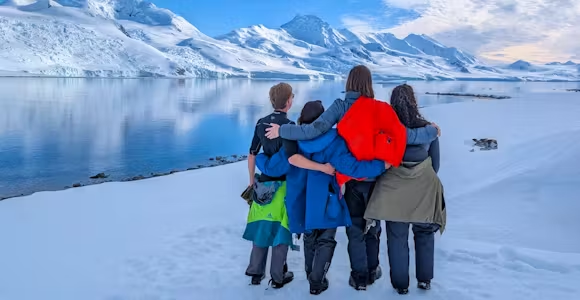
When to go to Antarctica
Choosing when to go to Antarctica is a key part of planning a cruise, with each month of the season offering a different side of the continent.
Discover More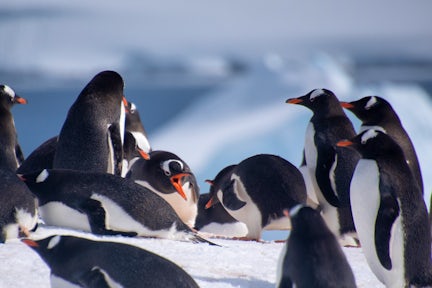
Gentoo penguins during breeding season
Gentoo penguins are the most commonly seen penguin on a cruise to the Antarctic Peninsula, and are easily distinguished by their chunky size, orange beaks and white patch that wraps around their heads like a pair of headphones.
Gentoos can be seen in large colonies across the Peninsula and South Shetland Islands and even as far north as South Georgia and the Falkland Islands. The frequency with which they’re seen belies their true numbers: there are just thought to be around 400,000 breeding pairs worldwide.
They’re one of the most entrancing species to watch, whether in the early breeding season when they spend plenty of time stealing pebbles from their neighbours to build their nests (which they then offer to their mate with a ceremonial bow), or when they’re looking after their pairs of chicks in the new year. There’s just as much fun to be had waiting by the shore and watching them porpoise through the water to emerge shining onto the land.
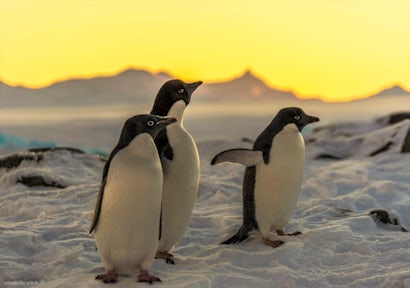
Adelie penguins in an Antarctic sunset
Ask a child to draw a penguin and it’s likely that they’ll draw something very much like an Adelie. With its solid black and white colour scheme, the Adelie is the very essence of penguin-ness.
Adelies are also a true symbol of Antarctica as they’re one of only two penguin species found nowhere else in the world and can breed farther south than even emperor penguins (the other true Antarctic penguin). While numbers are hard to estimate, its thought that there are around 4 million breeding pairs in Antarctica.
Adelie penguins can be found across the continent including along the Peninsula, though they tend to be more abundant on the western side of the Peninsula in the Weddell Sea rather than on the eastern side visited by most cruise ships.
Since Adelies are the first penguin species to depart their colonies, late season visitors may only see isolated birds out on the ice. True Adelie fans should plan to visit the Ross Sea instead in the hope of visiting Cape Adare, home to around one million Adelies – probably the largest colony in the world.
Everyone goes to Antarctica hoping that penguins will be just as delightful as they are in a nature documentary – and they're never disappointed. But what few people tell you is that a constant diet of fish and krill also make penguin colonies pretty stinky places!
Carola Zorzoli Groups Customer Experience Specialist
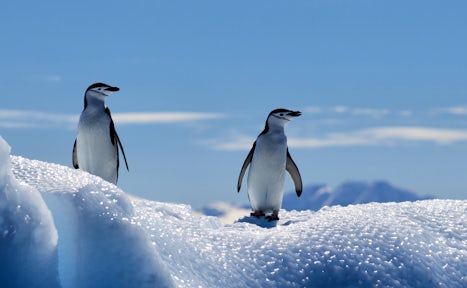
Chinstrap penguins on ice
Few penguins are as well-named as chinstrap penguins, for the thin black line of feathers running under their head, although the early explorers also dubbed them ringed penguins for exactly the same reason.
Chinstraps are a little smaller and slimmer than either gentoo or Adelie penguins. Some might say they’re slightly more elegant as a result, though they’re just as kleptomaniac as the gentoos when it comes to stealing pebbles for their nests. There are estimated to be around 3.4 million pairs of chinstrap penguins in the world.
Their distribution is more northerly than other species, with their biggest colonies found in the South Shetland, South Orkney and especially the South Sandwich Island groups, as well as the bottom tip of South Georgia.
They do still breed across the northern tip of the Peninsula however, with chicks arriving in pairs earlier in the season than any other penguin species.
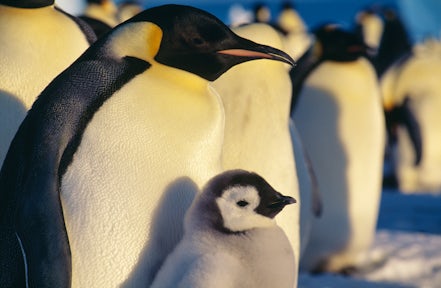
An emperor penguin and its chick
Star of movies like Happy Feet and March of the Penguins, the emperor penguin is probably the most famous penguin species of all as being the largest, standing at over a metre tall.
Emperors are also the toughest penguins by far. They’re the only species to breed during the Antarctic winter, huddling together on the ice shelf with their eggs balanced on their feet in the coldest, windiest and darkest conditions imaginable.
For the visitor, an emperor penguin sighting is a truly prized thing due to its rarity. You won’t find them on the Antarctic Peninsula due to the lack of permanent sea ice, although there is a colony at Snow Hill in the Weddell Sea that is accessible by helicopter: some ship operators run special trips at certain times of the season to see them here.
The alternative is to make the long trip down to the Ross Sea in Antarctica’s deep south, where around half of the world’s 256,000 breeding pairs make their home.
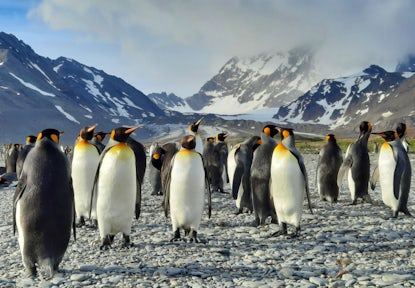
King penguins on South Georgia
Hardcore penguin aficionados may consider adding South Georgia to their Antarctica itinerary – it has the highest density of penguins you’ll find anywhere in the Southern Ocean.
The undisputed stars of the show here are the king penguins. Handsomely dressed in grey and white with bright orange patches on their black heads, kings are present here in almost unimaginable numbers. Colonies here are counted in the hundreds of thousands. A visit here is one of the most astonishing and immersive wildlife experiences anywhere on the planet.
South Georgia is also home to gentoo and chinstrap penguins, along with the foppish-looking macaroni penguin, with bright yellow eyebrow tufts.
South Georgia trips also include the Falkland Islands on the itinerary, which offer the opportunity of seeing the macaroni’s close cousin, the similarly bright and charming rockhopper penguin. Both species are cliff-dwellers, using their claws like mountaineers to reach their nesting sites. The Magellanic penguin, a burrow-dwelling species from South America, is also found on the Falklands, as well as gentoos and king penguins.
Finally, travellers cruising to the Ross Sea in search of emperor penguins should note that these itineraries include a stop at Australia and New Zealand’s sub-Antarctic islands such as Macquarie Island, where it’s possible to see royal penguins as well as kings, rockhoppers and gentoos.
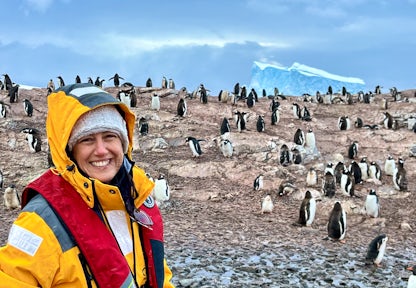
Visiting a gentoo penguin colony in March
The arrival of spring in November means two things in Antarctica: the start of the tourist season and the start of the penguin breeding season.
Early visitors to the Peninsula will see plenty of breeding behaviour, as penguins start to crowd around in their rookeries to claim their nesting spots the moment the snows start to melt. By December, you’ll see penguins on their pebble nests as well as still catching a few later bloomers trying to steal rocks to build their own nests.
With perfect timing, penguin chicks mostly hatch in time for Christmas, and are at their fluffiest and most photogenic by January. In February the first chicks are beginning to fledge and leave their nests – with tourists being frequent objects of their curiosity. Come March, the chicks are grown enough to explore the shallows, getting ready for the moment that the tourist season is over and they can head out into the waves to spend the winter at sea.
King penguins in South Georgia are a notable exception. Their unusually long breeding cycle of 14 months means that at any given time of the year you’ll find downy chicks in the colonies.
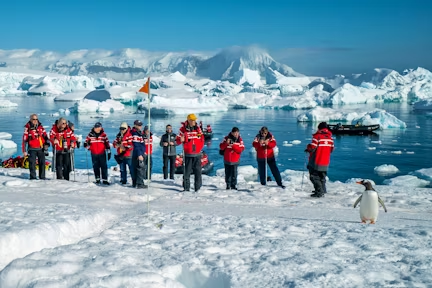
Watching penguins from a safe distance in Antarctica
To help protect Antarctica’s wildlife, strict wildlife watching guidelines are in place that all visitors must follow during a landing or zodiac cruise, developed by the International Association of Antarctica Tour Operators (IAATO).
Always maintain a distance of at least 5 metres between you and any animal. Penguins may approach you out of curiosity: if they do, you should quietly and safely retreat. Wildlife always has the right of way in Antarctica. Never walk on the penguin highways that criss-cross their colonies. If walking on deep snow always break down your footprints to avoid leaving holes that penguins might get trapped in.
Strict biosecurity rules are in place to avoid the accidental transmission of pathogens in Antarctica. You mustn’t sit or place any items on the ground and clean your boots with disinfectant before and after a landing. If you’re visiting in the late season and walking in ground covered with penguin guano, you’ll appreciate how sensible these precautions are!
These rules might seem strict before you travel but they quickly become second nature in the field. By carefully following them and the advice of your expedition guides, you can enjoy seeing Antarctica’s penguins in the knowledge that you’re doing your part to protect the health and wellbeing of their colonies.
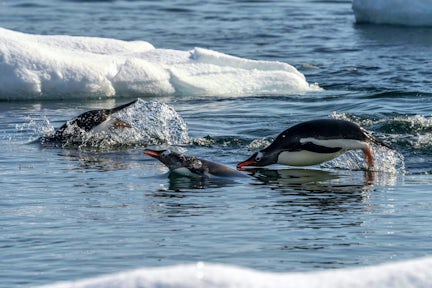
Gentoo penguins porpoising through the water
Like all Antarctic species, penguins find themselves on the frontline of climate change. The reduction in permanent sea ice is likely to have a strong negative effect on the two true Antarctic species, Adelie and emperor penguins. The life cycles of both are dependent on the presence of this ice: emperors breed only on the ice, while Adelies live on it during the winter.
The shrinking permanent ice on the Western Antarctic Peninsula has led to a steep decline in Adelie numbers here. Like the Adelie, chinstrap populations number in the millions of birds but also appear to be in decline across the Peninsula and South Shetlands for reasons that are not currently understood.
The effects of climate change are not always straightforward however. While both Adelie and chinstrap populations are in decline on the Western Antarctic Peninsula, research by the British Antarctic Survey has suggested that gentoo penguins here are taking advantage of the availability of breeding sites by establishing new colonies further south. Gentoo penguin numbers here may have grown by nearly a quarter in the past decade.
Price Match Promise - We’ll match any price you find elsewhere for the same trip

Choosing when to go to Antarctica is a key part of planning a cruise, with each month of the season offering a different side of the continent.
Discover More
From stepping foot on polar shores to zodiac cruises, and wildlife encounters to adventure activities, here’s what you can expect from an Antarctic cruise.
Discover More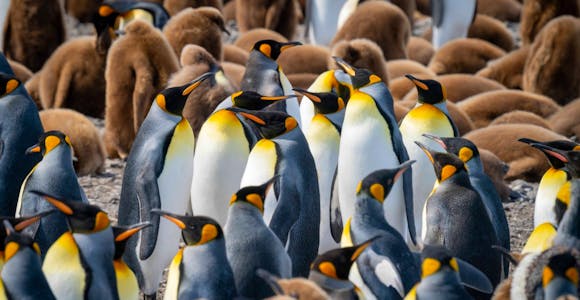
A jewel in Antarctica's crown, South Georgia is one of the world's great wildlife destinations: the Serengeti of the Southern Ocean
Discover More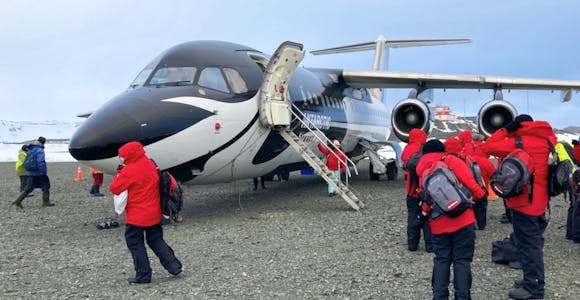
Fly & Cruise trips offer the best of Antarctica in one simple package: flying to the Peninsula in two hours to join an expedition cruise ship for a classic polar adventure.
Discover MoreWe'll spend some time listening to your aspirations, then discuss the kind of experience that might suit you.
Next we'll discuss the options, shortlist the best trips for you and present you our impartial recommendations.
We'll place a 24 hour hold on your preferred option - without obligation - whilst we talk through the details.
